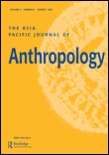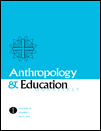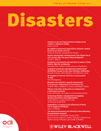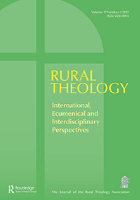
Anthropology in Action-Journal for Applied Anthropology in Policy and Practice
Scope & Guideline
Shaping Tomorrow’s Policies with Today’s Anthropology
Introduction
Aims and Scopes
- Applied Anthropology in Policy Contexts:
The journal emphasizes the application of anthropological insights to inform and shape public policy and practice, particularly in areas such as health, social justice, and community development. - Collaboration with Other Disciplines:
There is a consistent focus on interdisciplinary collaboration, particularly with fields such as computational sciences, public health, and education, to enrich anthropological methodologies and broaden the impact of research. - Reflexivity and Ethical Engagement:
A core area of interest is the reflexive practice within ethnographic research, addressing the ethical implications and the role of the researcher in various contexts, particularly in marginalized communities. - Crisis and Resilience Studies:
The journal explores human experiences and community resilience in response to crises, such as health emergencies and political upheaval, highlighting the role of anthropology in understanding and addressing these challenges. - Cultural and Social Dynamics:
Research often delves into cultural practices, social identities, and power dynamics, providing critical insights into how these elements influence public health and community well-being.
Trending and Emerging
- Public Health Anthropology:
There is a notable increase in research addressing public health issues, particularly in the context of the COVID-19 pandemic, showcasing how anthropological insights can inform health responses and community resilience. - Crisis and Emergency Response:
The journal has seen a rise in studies focused on anthropological contributions to crisis management and emergency response, reflecting the growing importance of understanding social dynamics during crises. - Intersectionality and Marginalization:
Emerging themes increasingly emphasize the experiences of marginalized groups, exploring how intersectional identities impact access to resources and health outcomes, thus advocating for equity in policy. - Digital Ethnography and Remote Research:
With the shift to online platforms during the pandemic, there is an emerging focus on digital ethnography, exploring how technology shapes social interactions and research methodologies. - Community Engagement and Participatory Research:
A growing trend towards participatory research methods highlights the importance of involving community members in the research process, ensuring that their voices are central to policy formation.
Declining or Waning
- Traditional Ethnographic Studies:
There appears to be a waning interest in traditional ethnographic studies that do not directly inform policy or practice, with a shift towards more applied and participatory approaches. - Historical Anthropological Analysis:
Research with a historical focus, particularly studies that do not connect to contemporary issues or policy implications, has become less prevalent, indicating a preference for current and emergent topics. - Overly Theoretical Discussions:
Papers that emphasize abstract theoretical frameworks without direct application to real-world issues are less frequently published, as the journal increasingly prioritizes practical outcomes and community engagement.
Similar Journals

Asia Pacific Journal of Anthropology
Fostering Dialogue on Asia Pacific AnthropologyAsia Pacific Journal of Anthropology is a premier academic journal dedicated to advancing the field of anthropology and cultural studies, published by Routledge Journals, Taylor & Francis Ltd. With an ISSN of 1444-2213 and E-ISSN 1740-9314, this journal has gained recognition for its rigorous scholarly contributions since its inception in 2000. Situated in the UK, it is strategically positioned to serve as a vital resource for researchers, professionals, and students exploring the rich complexities of human societies and cultures within the Asia Pacific region and beyond. As evidenced by its Q2 ranking in both anthropology and cultural studies for 2023, alongside its impressive Scopus ranks—#218 among 1304 in Cultural Studies and #157 among 502 in Anthropology—this journal illustrates a strong commitment to delivering high-quality, impactful research. While it is not an open-access journal, it remains a key platform for disseminating innovative research and fostering academic dialogue, thereby significantly contributing to the advancement of knowledge in the social sciences.

Cambridge Journal of Anthropology
Unlocking the future of anthropology through open access.Cambridge Journal of Anthropology is a prestigious and internationally recognized journal published by BERGHAHN JOURNALS, dedicated to advancing the field of anthropology. The journal, with ISSN 0305-7674 and E-ISSN 2047-7716, has embraced an Open Access model since 2020, ensuring that groundbreaking anthropological research is easily accessible to scholars, practitioners, and students worldwide. With a commitment to enriching the academic discourse in anthropology, the journal welcomes high-quality articles that contribute to both theoretical and applied aspects of the discipline. The Cambridge Journal of Anthropology serves as a vital resource for researchers eager to explore contemporary anthropological issues, fostering an inclusive dialogue on cultural diversity, social structures, and human experiences. As scholars increasingly turn to open platforms for disseminating their work, this journal stands out as a leading venue for innovative research that shapes the future of anthropology.

Urbanities-Journal of Urban Ethnography
Unveiling the Tapestry of Urban CulturesUrbanities - Journal of Urban Ethnography is a pivotal publication dedicated to the interdisciplinary field of urban anthropology. Published by the IUAES - Commission on Urban Anthropology in Italy, this journal serves as a platform for exploring the complexity of urban life through ethnographic methods, rigorously examining social practices, community dynamics, and cultural expressions within urban contexts. With its ISSN 2239-5725 and open access format, Urbanities promotes widespread dissemination of research findings, fostering academic discussions among researchers, professionals, and students alike. Over the years, it has secured a commendable standing in the academic community, evidenced by its Q2 ranking in Anthropology and Q3 in Urban Studies for 2023, along with respectable Scopus rankings. The journal's scope spans from 2015 to 2024, ensuring that it stays at the forefront of contemporary urban research. As a vital resource for anyone interested in the nuances of urban environments, Urbanities invites contributions that enrich our understanding of the urban experience and its myriad cultural dimensions.

ANTHROPOLOGY & EDUCATION QUARTERLY
Bridging Anthropology and Education for a Better TomorrowANTHROPOLOGY & EDUCATION QUARTERLY, published by Wiley, is a premier journal dedicated to the exploration of the interconnections between anthropology and education. With an impressive impact factor and esteemed recognition as a Q1 journal in both Anthropology and Education, this journal ranks among the top in its fields, sitting at 62nd in Social Sciences - Anthropology and 478th in Social Sciences - Education according to Scopus. Since its inception in 1977, the journal has served as a vital platform for engaging research and scholarship, fostering dialogue among researchers, practitioners, and educators. While no open access options are currently available, the journal provides insightful articles that advance theoretical and practical knowledge, emphasizing the importance of anthropological perspectives in educational contexts. The journal is committed to connecting interdisciplinary scholars and contributing to the ongoing discourse that shapes the future of education and cultural understanding.

DISASTERS
Pioneering research that informs disaster policy and practice.DISASTERS, published by WILEY, is a premier academic journal dedicated to advancing the understanding of disasters across multiple disciplines, including Earth and Planetary Sciences and Social Sciences. With a historical publication span from 1977 to 2024, this journal has established itself as a vital resource within the academic community, boasting a Q1 category ranking in both fields, indicating its high impact and relevance. DISASTERS ranks impressively in Scopus, holding the #27 position in General Social Sciences and #36 in General Earth and Planetary Sciences, reflecting its influence in shaping disaster research and policy. The journal serves as a platform for interdisciplinary collaboration, offering researchers, professionals, and students critical insights into disaster management, response strategies, and risk reduction measures. Although it is not an Open Access journal, DISASTERS remains a cornerstone for those looking to contribute to and stay informed about the evolving landscape of disaster studies.

Case Studies in the Environment
Transforming Environmental Education through Applied Case StudiesCase Studies in the Environment, published by University of California Press, serves as a vital resource for scholars and practitioners engaging with pressing environmental issues through applied research and practical case studies. With an ISSN of 2473-9510, this journal focuses on disseminating innovative solutions and educational approaches to sustainability while contributing significantly to the fields of Environmental Science and Education. Though it currently holds a Q3 classification in both Environmental Science and Education, as well as a Q4 in Renewable Energy, Sustainability, and the Environment, it provides targeted insights with potential to influence practices and policies. Based in the United States, the journal has contributed to academic discourse since its inception in 2017, and it continues to be an important platform for interdisciplinary research aimed at fostering a sustainable future. Researchers, educators, and students alike will find valuable information and case analyses that highlight best practices and address real-world challenges. Access to this journal’s articles is facilitated through its commitment to open access, ensuring widespread dissemination of knowledge across the global community.

Rural Theology-International Ecumencial and Interdisciplinary Perspectives
Exploring the Sacred in Rural SpacesRural Theology: International Ecumenical and Interdisciplinary Perspectives is a pivotal journal published by Routledge Journals, Taylor & Francis Ltd, dedicated to the exploration and discourse surrounding the interplay of theology in rural contexts. With an impressive Q1 ranking in Religious Studies and a substantial Scopus rank of #49 out of 644, the journal stands as a leading platform for innovative research and scholarly dialogue. It encompasses a diverse range of perspectives, encouraging interdisciplinary collaboration and contributing to the vibrant field of rural theology, particularly within ecumenical frameworks. Although Access options are currently not designated as Open Access, the journal remains indispensable for researchers, practitioners, and students keen on analyzing the theological dimensions of rural life. Since its inception in 2014, Rural Theology has committed to elucidating the unique challenges and opportunities that rural communities face, making it essential reading for anyone invested in this vital area of study.

China Nonprofit Review
Unveiling Insights into China's Evolving Nonprofit LandscapeChina Nonprofit Review, published by TSINGHUA UNIVERSITY PRESS, serves as an essential platform for the dissemination of research and discussion surrounding the nonprofit sector in China and its global implications. With its ISSN 1876-5092 and E-ISSN 1876-5149, this journal covers a wide spectrum of topics relevant to the fields of Economics, Sociology, and Political Science, though it features a Category Quartile ranking of Q4 across various disciplines as of 2023. Despite its nascent stages in a competitive landscape, the journal seeks to elevate the discourse around nonprofit management and policy by enriching the academic community with original research and critical analyses. Researchers, professionals, and students can benefit from the insights into the evolving challenges and innovations within the nonprofit realm, fostering an understanding that transcends borders. As the nonprofit landscape continues to expand and adapt, China Nonprofit Review is positioned to contribute significantly to scholarly conversations and practical applications in this dynamic and impactful field.

Social Analysis
Bridging Anthropology, Culture, and SocietySocial Analysis, an esteemed academic journal published by BERGHAHN JOURNALS, is at the forefront of interdisciplinary research, focusing on the dynamic intersections of anthropology, cultural studies, sociology, and the arts and humanities. Since its inception in 2002 and having transitioned to an Open Access model in 2020, the journal ensures that critical social research is widely accessible to scholars and the public alike. With an impressive Q1 ranking in Anthropology and cultural studies and holding a notable Q2 in Sociology and Political Science, it garners attention from a large academic audience, as evidenced by its high Scopus rankings: 10th in general arts and humanities and 153rd in cultural studies. This signifies its influential role in shaping contemporary discourse and providing a platform for innovative ideas and methodologies in understanding social phenomena. Based in Brooklyn, NY, the journal is dedicated to fostering scholarly dialogue and advancing the field, making it an essential resource for researchers, professionals, and students eager to engage with and contribute to the field of social analysis.

Lares-Quadrimestrale di Studi Demoetnoantropologici
Advancing Knowledge in DemoethnoanthropologyLares-Quadrimestrale di Studi Demoetnoantropologici is a prominent scholarly journal dedicated to the fields of demoethnoanthropology, exploring the intersections of cultural practices, traditions, and social dynamics. Published by CASA EDITRICE LEO S OLSCHKI, this esteemed journal provides an academic platform for researchers and practitioners to disseminate original research findings and critical reviews, delving into ethnographic studies and community-based inquiries. With an ISSN of 0023-8503 and an E-ISSN of 2036-511X, Lares is recognized for its commitment to scholarly excellence and its contribution to advancing knowledge within its field. Although it currently categorizes as non-open access, the journal remains highly regarded among academics, ensuring the widespread dissemination of significant research. The journal's base in beautiful Florence, Italy, enhances its cultural richness and appeal, making it a notable reference point for scholars dedicated to the study of human cultures and social systems.